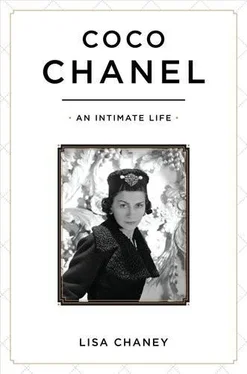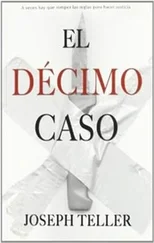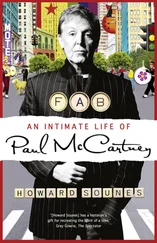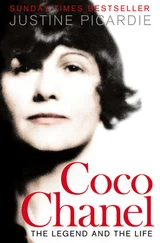After the war, Gabrielle railed against some of those she knew, such as the writer and future statesman André Malraux, who were “destroying” themselves with drugs. But while Gabrielle denied those things she didn’t wish others, or herself, to believe about her, as her future assistant would say, “This didn’t stop her from lying a lot.” 9While Fenosa objected to Gabrielle’s using drugs at all, Gabrielle was able to convince herself that she didn’t because she was always able to keep it under control.

Gabrielle stayed at André Palasse’s château for a few weeks and then made her way to Toulouse. Fenosa contacted several of their mutual friends, such as Cocteau, who were not far away, and ordered them to come to Vernet-les-Bains, where they spent time at the house of friends. Cocteau was relieved at the arrival of Jean Marais, demobilized after the collapse of France, and Pétain’s armistice. Marais had starred in Cocteau’s Oedipus Rex in 1937, for which Gabrielle had designed the costumes.
Once she knew that the Germans wouldn’t bomb Paris, she wanted to return, and soon set off with Marie-Louise Bousquet and a female doctor on a journey busy with event. Bousquet knew someone who had forty-five or so liters of petrol, which they had to carry with them in the sweltering summer heat. Reaching Vichy, the women were down to their last liter of fuel. Now that Vichy was the capital of the southern half of France, which Hitler had chosen not to occupy, the travelers were obliged to stop there for papers in order to be allowed to cross into the occupied northern sector of the country, and Paris. Pétain and Pierre Laval’s government was ruling Vichy France from a series of the spa town’s hotels. (Laval had two terms as head of the Vichy government, signing the deportation papers of many Jews to the death camps, for which he would be executed after the war.) The U.S. ambassador, William Bullitt, talked with the new government officials, then sent a dispatch to President Roosevelt, saying:
The French leaders desire to cut loose from all that France has represented during the past two generations. Their physical and moral defeat has been so absolute that they have accepted completely for France the fate of becoming a province of Nazi Germany… the simple people of the country are as fine as they have ever been. The upper classes have completely failed. 10
This failure, of course, had been the implication in Renoir’s satire, hence its banishment from the screen. As someone who remained ambivalent toward this class, it seems appropriate that Gabrielle had designed the film’s wardrobe.
In Vichy, Marie-Louise and Gabrielle ate at the Hôtel du Parc, where they were taken aback by the general air of celebration. Gabrielle said, “Everyone was laughing and drinking champagne.” 11Her ironic comment on this festive atmosphere provoked a man to confront her, and his wife had to calm him down.
Where were the travelers to spend the night? “A gentleman offered me his bed on condition that I share it with him. I managed to persuade the owner of the hotel and they put me up in the garret where the heat was killing. I got up every hour and went into the bathroom just to breathe.” Marie-Louise had a chaise longue placed in a linen room for her. 12
Assisted by the prefect of police, they managed to obtain more petrol, and Gabrielle, Marie-Louise and the doctor set off once more for Paris. Reaching a roadblock, no one was allowed through except Belgians returning home. The women attempted side roads, but these were jammed with cars trying to do the same thing. Moving forward slowly, wherever they stopped they could find nothing to eat. Finally reaching another spa town, where everyone was very jittery because the hotels were all booked but no one had turned up, the travelers were offered three large rooms, each with its own bath.
Gabrielle went out for a walk and was duped by a child into giving him some money. This he immediately gave to his mother and told Gabrielle, “Now we’ll be able to eat tonight.” The woman had another child with her and was pregnant. When she revealed her almost empty purse, Gabrielle was struck by her destitution.
When the travelers finally reached Paris, on the rue de Rivoli and place de la Concorde they could see only German soldiers. A swastika was flying above the Ritz, as it was from all the major hotels. The MBF, the Wehrmacht military command in France, had its seat in the Hôtel Majestic on avenue Kléber. Here was centerd the administration, the management of the economy and the maintenance of order. Here, too, Joseph Goebbels had his Propaganda-Abteilung (Propaganda Division) immediately begin its work. Posters were up everywhere announcing that “the English and the Jews have brought you to this sorry pass.” Food and cigarettes were distributed, as was a poster of a Nazi soldier caring for some little children that bore the slogan: “Abandoned peoples, put your trust in the German soldier.” German street signs, instructions and banners were everywhere.
A large number of overlapping organizations now ruled the French. Many Nazi officers worked in France under direct orders from Berlin, while inin Paris itself, the MBF was always skirmishing with Ribbentrop’s Ministry of Foreign Affairs — in this case, the German embassy. Eventually, Ribbentrop’s protégé, Otto Abetz, became arguably more important than the MBF, and was dubbed King Otto I.
All requisitioned hotels had armed soldiers posted at their doors. Gabrielle was barred entry to the Ritz without an Ausweiss (permit) and was told she must seek permission from the commandant. There are several versions of what happened next, but eventually Gabrielle was given leave to remain at the Ritz. However, her grand suite of rooms was now inhabited by German officers. She was offered one small room on the rue Cambon side of the hotel. She agreed.
Misia was appalled at Gabrielle’s acceptance of a shabby room, and at her choice to remain in a hotel requisitioned by the enemy. However, to Gabrielle, these considerations simply weren’t relevant. For all her beautiful houses and elegant possessions, her attachment to these went only so far. She was always able to withdraw from attachment to things. Her strongest sense now was survival. And her means of survival — her shop — was just over the road on rue Cambon. Gabrielle didn’t care what people thought, and she asked Misia what point there was in going somewhere else. Sooner or later, all the hotels would be “occupied” anyway. At 31 rue Cambon, meanwhile, the Chanel boutique was busy: German soldiers were buying Chanel № 5 for their womenfolk back home. Albeit limited in its production, the perfume would continue being sold throughout the four years of France’s occupation.
Despite the occupation, ten or so of Gabrielle’s fellow couturiers had remained open to carry on their work. Shortages of all materials, which would continue throughout the war, meant they were struggling to bring out their new collections. Schiaparelli and Mainbocher would go to America; Edward Molyneux fled to London. For those who stayed, the shows were attended by some French women, German embassy staff and some of the German command. They escorted their wives, including Emma Goering and Suzanne Abetz, wife to the man the Reich called the German ambassador. Following lengthy and delicate negotiations, Lucien Lelong, president of the Chambre Syndicale de la Couture Parisienne, dissuaded the German command from moving the entire Parisian couture business to Vienna and Berlin. He argued that Parisian fashion could be made only in Paris. He also succeeded in keeping 80 percent of couture’s workforce, against constant demands for extra labor from German war industries intent on rapid expansion. Lelong even obtained special dispensations for the couturiers to buy costly fabrics without using their ration tickets. But a change in their clients was quickly noticed by all the fashion houses. Lelong would say:
Читать дальше













